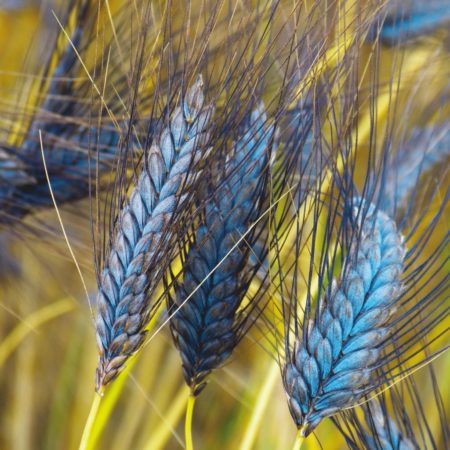- Breeding grass while high. Probably not what you’re thinking.
- When life gives you ancient lemons.
- Potato Museum gets new website.
- Mango gets a database.
- So do France’s genebanks.
- The oldest living cultivated fruit tree in North America? I think not, but interesting nevertheless.
- Whiskey goes heirloom.
- Excerpt from Spencer Wells’ Pandora’s Seed on the Neolithic Revolution.
- Our occasional contributor Robert Hijmans sings the praises of mapping with R.
Where is Utrecht blue wheat from?

We have this beautiful wheat in our collection, received from Sharon Rempel. However, we cannot trace it coming from the NLD. Utrecht area was not a wheatgrowing area. In the early 1900s durum and emmer was not grown in NLD. If any one knows its origin, please let us know!
— Centre for Genetic Resources, the Netherlands (@CGN_Wageningen) June 12, 2018
Can you help our friends at CGN? There is a wheat of this name in Genesys whose origin is given as Canada, but I can find no Utrecht in that country.
Brainfood: Sustainable Brazil, Epigenetic variation, Global conservation, Rice nutrition, Austronesian societies, Saharan domestication, GM wheat, Smallholders, Bos introgression
- Sustainable diet from the urban Brazilian consumer perspective. Healthiness, basically.
- Comparison of the Relative Potential for Epigenetic and Genetic Variation To Contribute to Trait Stability. Genetic >> epigenetic.
- Global mismatch of policy and research on drivers of biodiversity loss. Except for climate change.
- Carbon dioxide (CO2) levels this century will alter the protein, micronutrients, and vitamin content of rice grains with potential health consequences for the poorest rice-dependent countries. And not in a good way. But some variation among varieties = breeding opportunity?
- Coevolution of landesque capital intensive agriculture and sociopolitical hierarchy. Among Austronesian-speaking societies, no evidence that agricultural intensification drives social complexity; if anything, it’s the other way around.
- Plant behaviour from human imprints and the cultivation of wild cereals in Holocene Sahara. Weediness has been good to humans in the past.
- Gene Flow in Genetically Modified Wheat. Would probably only be a problem within fields.
- How much of the world’s food do smallholders produce? FAO: 70%. New paper: 30-34%.
- Pervasive introgression facilitated domestication and adaptation in the Bos species complex. Miscegenation has been rampant.
Another hymn to Vavilov. Amen
Hard on the heels of the 99 per cent Invisible podcast on Svalbard comes another once-over-lightly on NI Vavilov. A book by photographer Mario del Curto documents the genebank in St Petersburg and the legacy of its founder. A review of the book is mostly fine and dandy, although I do take issue with this image.

The caption reads “Sunflower plant at the Kuban research station (from Seeds of the Earth: The Vavilov Institute, © Mario Del Curto)”.
Can that possibly be correct?
99% genebanks
Svalbard is a remote Norwegian archipelago with reindeer, Arctic foxes and only around 2,500 humans — but it is also home to a vault containing seeds for virtually every edible plant one can imagine. The mountainside Crop Trust facility has thousands of varieties of corn, rice and more, serving as a seed backup for humanity. For each crop, there’s an envelope with 500 seeds.
Nice podcast, as ever, and glad they removed the reference to coconuts in the text, originally in there with rice and corn.